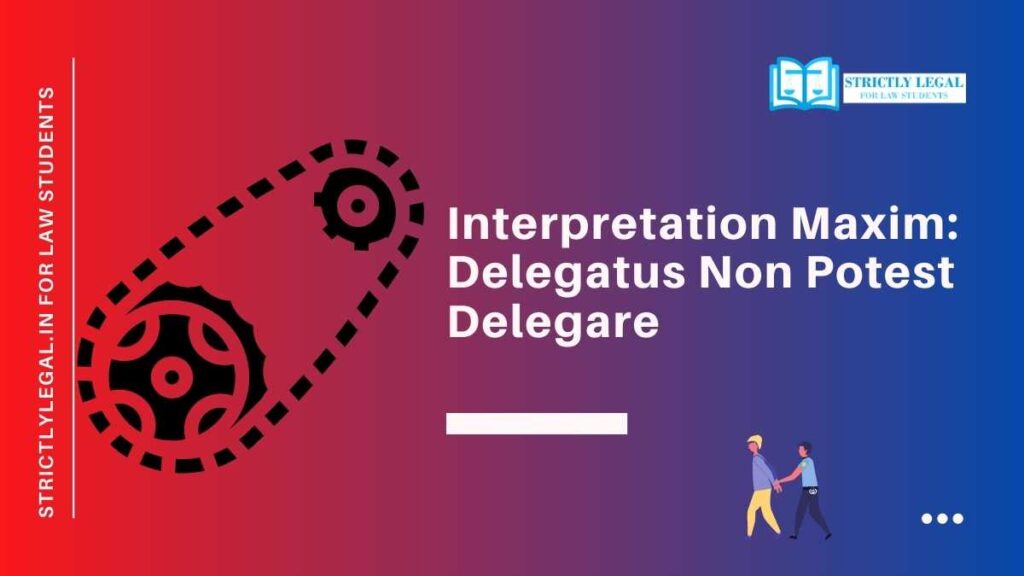Legal maxims are established principles of law or propositions that mostly originated in medieval ages and hence expressed in Latin language. We’ve already covered 101 Legal Maxims that every law students should know and in this article, we will discuss Delegatus Non Potest Delegare.
Plain English meaning: Delegated power cannot be further sub-delegated
This maxim is mostly used in Constitutional and Administrative law and it states that “one to whom power is delegated cannot himself further delegate that power” However, subject to the provisions of the enabling Act.
In the Indian legal scenario, it came up first in A K ROY v. State Of Punjab, (1986) 4 SCC 326, that sub delegation of delegated power is ultra vires to the act that enables it.
In other words, Any delegated power cannot be further delegated unless the delegating authority expressly permits such delegation.
Table of Contents
What is the meaning of delegation?
Delegation refers to the passing of powers or authority or responsibility to another. It generally means the parting of powers to do something to someone else which the person delegating had to do himself.
Justice Mathew in case of Gwalior Rayon Silk Manufacturing (Wvg.) Co. Ltd. v. The Assistant Commissioner of Sales Tax and Others has stated that it is not necessary that the person delegating extinguishes or renounces all powers, responsibility, and authority on such delegation.
He says, “Delegation is not the complete handing over or transference of a power from one person or body of persons to another. Delegation may be defined as the entrusting, by a person or body of persons, of the exercise of a power residing in that person or body of persons, to another person or body of persons, with complete power of revocation or amendment remaining in the grantor or delegator. It is important to grasp the implications of this, for, much confusion of thought has unfortunately resulted from assuming that delegation involves or may involve, the complete abdication or abrogation of a power. This is precluded by the definition. Delegation often involves the granting of discretionary authority to another, but such authority is purely derivative. The ultimate power always remains in the delegator and is never renounced.”
What is the meaning of sub-delegation?
Sub-delegation refers to further transferring powers, authority, and responsibility to some other person. Such sub-delegation can only be possible if the parent authority that had delegated the power in the first place itself permits it.
In other words, a sub-delegation is not permissible unless the said power is conferred expressly or by necessary implication and in the absence of such an express authorization, power cannot be sub-delegated. In the case of, Ganapati v. State of Ajmer, the parent act empowered the chief commissioner to make rules for the establishment of a proper system of conservancy and sanitation. The chief commissioner made a rule which empowered the district magistrate to devise his own system. Thereby, sub-delegating the power to the District Magistrate. The Supreme Court of India held that the rule made by the district magistrate was invalid since it was a sub-delegation without express authority. But if the parent act authorizes to sub delegate then it can be validated.
How far can powers be delegated or sub-delegated?
Delegated or Sub-delegated powers with prior authorization from the parent authority are valid but power is not unleashed but limited. Just like delegation, sub-delegation is also subject to the doctrine of excessive delegation.
For example, this doctrine of excessive delegation is used by courts to measure if the extent of power transferred is outside the scope or if it’s too broad. In the case of Mahe Beach Trading Co. v. Union Territory of Pondicherry. 1996 , 3 SCC 741 it was held that “The delegated authority must only implement stated policy, but if there is an abdication of legislative power by transferring policy formulation role to the delegate, then there is excessive delegation, which will be invalidated by the court
In simple words, the power of policy formulation lies with the legislature as conferred by the Constitution of India. The legislature can delegate powers to frame minor changes to bring these policies into affect but cannot transfer the whole power of policy formulation to some other body that is not legislature. That would be too wide delegation and hence invalid under the doctrine of excessive legislation.
Case laws related to Delegatus Non Potest Delegare
Ultra Tech Cement Limited vs. The Union of India and Ors., the Kerela HC held that sub-delegation refers to the further delegation of the same powers that was originally delegated by the legislature. In this context, if the law confers power on the central government to make rules on behalf of the legislature, the CG cannot further delegate the power to any other officer unless that parent act permits such delegation.
In the case of The State vs Kunja Behari Chandra And Ors., the Patna HC while referring to Delegatus Non Potest Delegare has held that the legislative power of the Government is vested exclusively with the legislature and any action abdicate or transfer such power shall be void. In other words, the state can never transfer the power of policy-making or formulation of laws to any agency other than the legislature. Any such delegation shall be unconstitutional.

Passionate about using the law to make a difference in people’s lives. An Advocate by profession.





